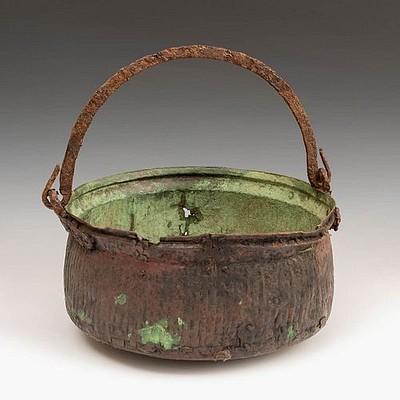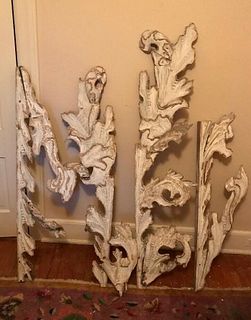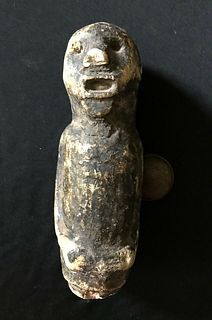Statue Khmer Culture, Cambodia, 12th century. Sandstone. Measures: 73 x 40 x 17 cm. sculpture; 84 cm. high with pedestal.
Lot 80
About Seller
Setdart Auction House
Carrer Aragó 346
Barcelona
Spain
Setdart Subastas was born in 2004 and is currently the first online art auction in Spain with solidity, prestige and reliability guaranteed by our more than 60,000 users. Setdart has a young, dynamic and enterprising team ready to successfully manage the purchase and sale of art works through custom...Read more
Estimate:
EUR€14,000 - EUR€16,000
$15,053.76 - $17,204.30
Absentee vs Live bid
Two ways to bid:
- Leave a max absentee bid and the platform will bid on your behalf up to your maximum bid during the live auction.
- Bid live during the auction and your bids will be submitted real-time to the auctioneer.
Bid Increments
| Price | Bid Increment |
|---|---|
| EUR€0 | EUR€10 |
| EUR€200 | EUR€25 |
| EUR€500 | EUR€50 |
| EUR€1,000 | EUR€100 |
| EUR€3,000 | EUR€200 |
| EUR€5,000 | EUR€500 |
| EUR€10,000 | EUR€1,000 |
| EUR€20,000 | EUR€2,000 |
| EUR€50,000 | EUR€5,000 |
About Auction
By Setdart Auction House
Dec 22, 2021
Set Reminder
2021-12-22 08:30:00
2021-12-22 08:30:00
America/New_York
Bidsquare
Bidsquare : Archaeology, Session I
https://www.bidsquare.com/auctions/setdart-auction-house/archaeology-session-i-8050
Setdart Auction House sofia@setdart.com
Setdart Auction House sofia@setdart.com
- Lot Description
Statue Khmer Culture, Cambodia, 12th century. Sandstone. Measures: 73 x 40 x 17 cm. sculpture; 84 cm. high with pedestal. Round sculpture made of sandstone representing the body of a man with a naked torso. The stylistic characteristics of the treatment of the material reveal that this sculpture belongs to the Khleang style developed in the period of Angkor (800-1200 AD). It could represent some divinity, materialized in human form. The Khleang are two buildings of unknown purpose on the east side of the Royal Plaza in Angkor and have given their name to the Khleang style, which is characterized by relatively simple lintels with a central kala and in the case of sculpture is characterized by the representation of a modeled anatomy of idealized character characterized by its stylization. The Khmer or Khmer is one of the most important cultures developed in Indochina. At the beginning of the 7th century, the first inscriptions in their language appear in the Indian kingdom of Tshenla, located in the middle course of the Mekong River. The Khmer reorganized politically, and in the 9th century achieved the unity of present-day Cambodia under the reign of Jayavarman II (802-850), founder of the kingdom of Angkor. This monarch had spent his youth in the refined court of the sailendra of Java, so he brought to his country an important influence of the Javanese culture, as well as the courtly protocol of that dynasty. The Khmer art reached its moment of splendor during the period of Angkor, developed between the IX and XIII centuries, and reached very different areas, such as textiles, lacquer, ceramics, goldsmithery, etc. As for Khmer sculpture, from the 7th century it began to separate from the Indian influence and, after a long process of stylistic evolution, it developed its own original language, consolidated in the 10th century. It will be mainly carved in stone and with religious themes, although on numerous occasions the sacred theme becomes a mere excuse to represent courtly scenes, even if they feature gods. Hence the greater degree of realism with respect to Indian art, since the artists took royal courtiers as models. The result is admirable images of gods of imposing presence, endowed with a certain feminine sensuality and sophisticated beauty.
- Shipping Info
-
In-house shipping available. Please inquire at admin@setdart.com.
-
- Buyer's Premium



 EUR
EUR CAD
CAD AUD
AUD GBP
GBP MXN
MXN HKD
HKD CNY
CNY MYR
MYR SEK
SEK SGD
SGD CHF
CHF THB
THB














